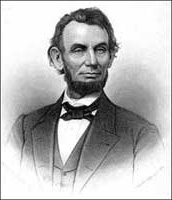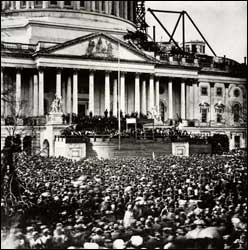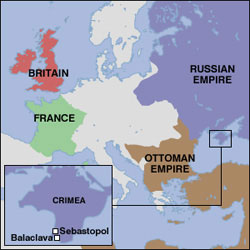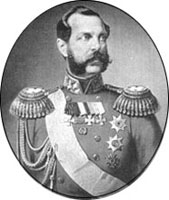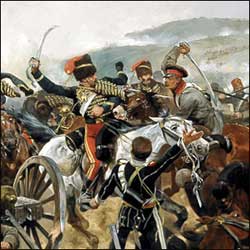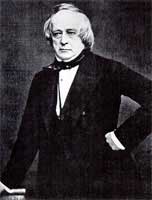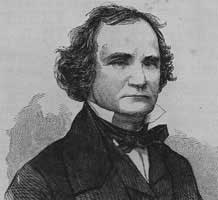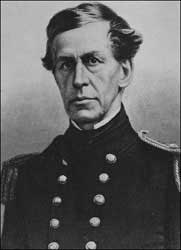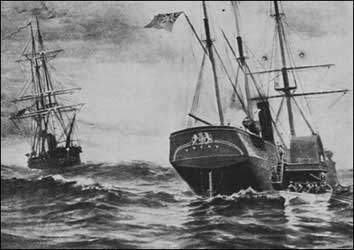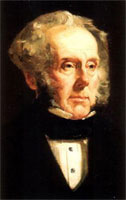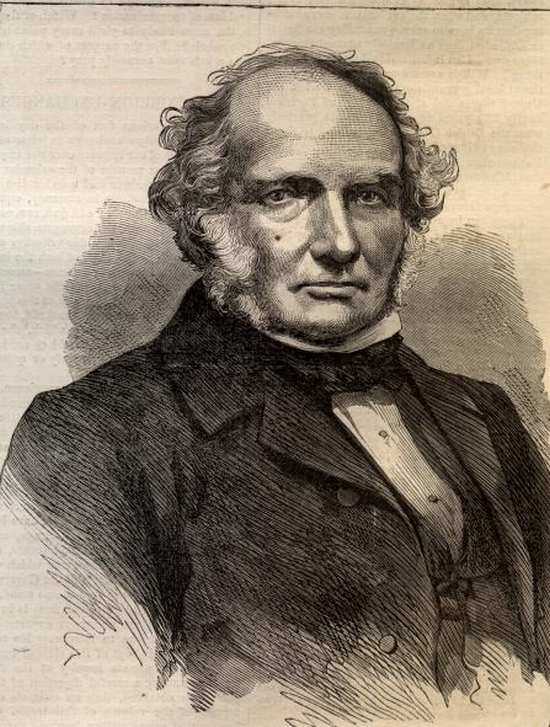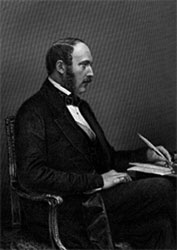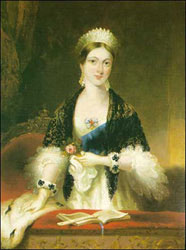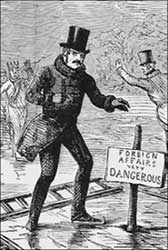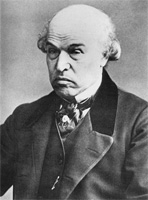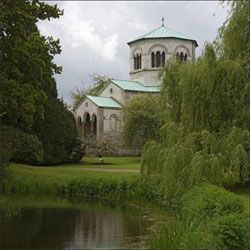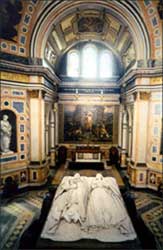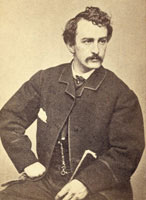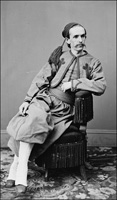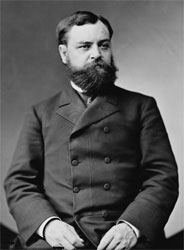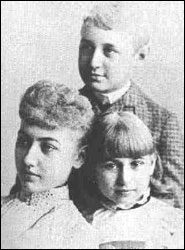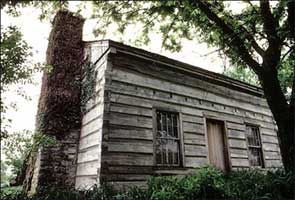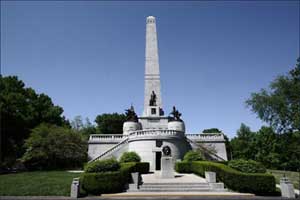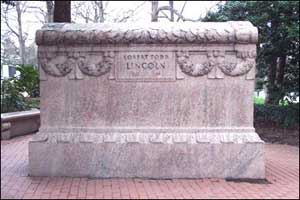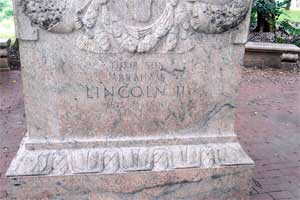|
February
12, 1809 - April 15, 1865 |
President Lincoln was highly resolved that the brave men who died to save the Union did not die in vain:
. . . and that this nation, under God, shall have a new birth of freedom—and that government of the people, by the people, for the people, shall not perish from the earth. (Gettysburg Address).
In 1861, 11 states out of a total of 33 left the Union and called themselves the CONfederate States. This is no marvel because according to the Bible, 1/3 of the angels were dissatisfied with the perfect environment of Heaven and joined Lucifer in a failed rebellion against the Almighty:
And there was (civil) war in heaven: Michael and his angels fought against the dragon; and the dragon fought and his angels,
And prevailed not; neither was their place found any more in heaven.
And the great dragon was cast out, that old serpent, called the Devil, and Satan, which deceiveth the whole world: he was cast out into the earth, and his angels were cast out with him. (Revelation 12:7-9).
None of the leaders of the rebellious states dared to let the PEOPLE decide by vote, or referendum, if they should leave the Union.
Those rebellious states wanted to help restore the British Louisiana Territory, and undo the work of general Jackson at New Orleans.
To the newly elected President Lincoln devolved the Herculean task of ending the insurrection and restoring the rebellious states to the Union.
|
This international conflict would have involved Great Britain, France, Mexico, Russia and Prussia.
The Vatican was insanely jealous of the growth of the U.S. and Russia!!
By 1850, the United States had fulfilled its Manifest Destiny by stretching from the Atlantic to the Pacific Oceans, and from Canada to the Rio Grande. Russia stretched from the Arctic Circle in the north to the Black Sea in the south; and from Poland in the west to Vladivostok on the Pacific Ocean. Russia also included the vast territory of Alaska in its possessions.
The Vatican viewed the growth of these 2 great countries with alarm and jealousy. Russia was the main bastion of the Orthodox Congregation which the Vatican had been vainly fighting for almost 1,000 years.... The U.S. was the home of Protestant Christianity, republicanism and . . . liberty!!
Here is a quote from the book Democracy in America, written by the renowned French historian, Alexis de Tocqueville, in 1834:
In 1854, Britain and France—normally deadly rivals—joined forces with the Terrible Turks to fight against Mother Russia. This alliance was also the precursor to NATO: North Atlantic Terrorist Organization.There are two great peoples on the earth today who, starting from different points, seem to advance toward the same goal: these are the Russians and the Anglo-Americans.
Both have grown largely in obscurity; and while men's regards were occupied elsewhere, they have suddenly taken their place in the first rank of nations, and the world has learned of their birth and of their greatness almost at the same time.
All other peoples appear to have nearly reached the limits that nature has drawn and to have nothing more to do than preserve themselves; but these are growing: all the others have halted or advance only with a thousand efforts; these alone march ahead at an easy and rapid pace on a course whose bounds the eye cannot yet perceive.
The American struggles against the obstacles that nature opposes to him; the Russian grapples with men. The one combats the wilderness and barbarism, the other, civilization vested with all its arms: thus the conquests of the American are made with the plowshare of the laborer, those of the Russian, with the sword of the soldier.
To attain his goal, the first relies on personal interest and allows the force and the reason of individuals to act, without directing them.
The second in a way concentrates all the power of society in one man. The one has freedom for his principal means of action; the other servitude.
Their point of departure is different, their ways are diverse; nonetheless, each of them seem called by a secret design of Providence to hold the destinies of half the world in its hands one day. (Alexis de Tocqueville, Democracy in America, pp. 395-396).
The Crimean War was the precursor to the U.S. Civil War!!
The first shots of the Civil War were actually fired in the Crimea in 1854.
Great Britain and France–normally bitter enemies–united in a military alliance against Russia. They were joined by the Terrible Turks and the war was called the Crimean War. It lasted from 1854 to 1856.
Great Britain and France knew that Russia would be the only friendly power to the young U.S. Republic in the coming invasion of that country.
As a result, they declared war on Tsar Nicholas I and attacked the Russian Black Sea port of Sevastopol. Sevastopol was the principal Russian naval base, and the major outlet for their ships to the Mediterranean Sea and Atlantic Ocean.
In 1855, Tsar Nicholas I died of poisoning, and his son, Alexander II, inherited the disastrous Crimean War.
|
This history is repeating itself today with the CONfederates at the Pentagon intent on destroying Russia FIRST before they renew the Civil War and destroy the Union.
|
In the peace treaty signed in 1856, Russia had to agree to give up use of her Black Sea fleet entirely, and their greatly devastated navy had only the Baltic and Pacific ports left.
This war was to be a replay of the War of 1812, only this time an internal insurrection would aid the invasion force. The Prime Minister of Great Britain at that time was Lord Palmerston–and he was just itching for a fight....Even before the first battle of Bull Run commenced in July 1861, Palmerston recognized the Confederacy as belligerents:
On May 6, in answer to a question put to him in the House of Commons concerning the proposed policy of Great Britain toward the Confederacy, his lordship said "The attorney and solicitor-general, and the queen's advocate, and the government have come to the opinion that the Southern Confederacy of America, according to those principles which seem to be just, must be treated as a belligerent." On May 13, the very day that Mr. Adams landed at Liverpool and only a few hours before he arrived in London, as if to exhibit the greatest possible lack of courtesy toward him and the government which he represented, the queen's neutrality proclamation was issued. It forbade the enlistment of all British subjects on land or sea in the service of either of the contending parties and also warned her majesty's subjects not to carry officers, soldiers, dispatches, or any article of the nature of contraband of war for the use or service of either the Federals or Confederates. This constituted a complete recognition of the Confederacy as a belligerent power, that is, as entitled, so far as England was concerned, to all those exceptional rights and privileges that international law assigns to sovereign states which are at war with each other. (Harris, The Trent Affair, pp. 38-39).
Lord Palmerston referred to the Battle of Bull Run as the Battle of Yankee run. All Palmerston now needed was a excuse to declare war on the United States.
The Trent Affair
The Trent Affair almost led to another war between Great Britain and the United States.
In August 1861, CONfederate president Jefferson Davis, appointed James M. Mason, former senator of Virginia, as a special commissioner to Britain. John Slidell, former Senator of Louisiana, was appointed special commissioner to France.
|
Their appointments were announced in the rebel newspapers weeks in advance.
As they were crossing the ocean in the British steamer Trent, a British spy named Captain Charles Wilkes stopped the steamer on the high seas and took Mason and Slidell, and their 2 assistants, by force, to the San Jacinto.
They allowed the steamer to proceed on its way to Liverpool, and as expected, the incident caused a furor in Great Britain.
Had the San Jacinto taken the Trent steamer to a U.S. port, it would have been recognized as contrand of war, as Great Britain had recognized the Confederacy as belligerents.
|
Wilkes was born in New York City in 1798; the great nephew of the former Lord Mayor of London, John Wilkes. His mother was Mary Seton who died in 1802 while Charles was three years old. As a result, Charles was raised by his aunt, Elizabeth Ann Seton, a convert to Roman Catholicism who was the first American born woman to be canonized a saint by the Catholic Church. When Elizabeth was left widowed with five children, Charles was sent to a boarding school. He later went to Columbia College, now known as Columbia University. He entered the United States Navy as a midshipman in 1818, and became a lieutenant in 1826.
In 1833, for his survey of Narragansett Bay, he was placed in charge of the Navy's Department of Charts and Instruments, out of which developed the Naval Observatory and Hydrographic Office.
Wilkes led an expedition to the South Seas and Antarctica, but he was court marshaled for his brutal conduct to members of his crew.
Captain Charles Wilkes then proceeded on to Boston where the 2 commissioners were imprisoned.
War fever in Great Britain over the Trent Affair!!
When the Trent reached Liverpool on Nov. 27, word quickly spread about the incident on the high seas. The dogs of war were immediately unleashed. It was like the war hysteria in the U.S. following the bombing of Pearl Harbor:
Preparations were also made for placing the military forces upon a war footing, and it was arranged to increase the army in Canada at once by an addition of thirty thousand men. Recruiting began with unusual vigor. The very flower of the British standing army were mustered and passed in review, after which they embarked for Halifax. Among them were all of the most noted batteries and regiments, among which were the guards, to whom was accorded the distinguished honor of taking part in all important wars. These were the first to start to the seat of war. They believed that they were going to Charleston to help the Confederates. The guards played the well known American air, "I am off to Charleston," while embarking on their vessels.
Thurlow Weed, who was then in England, says: 'I rose early on Friday morning and went down to St. James's barracks to see a regiment of Guards take up their line of march for Canada. Nearly fifty years had elapsed since I had seen 'British red-coats' whose muskets were turned against us. Something of the old feeling–a feeling which I supposed had died out, began to rise, and, after a few moments of painful thought, I turned away'. (Harris, The Trent Affair, pp. 143-144).
Lord Palmerston conferred with rebel commissioner Mann of Georgia
Rebel president Jefferson Davis had not waited for the outbreak of hostilities to make his first overtures to the Great Powers. Scarcely had Southern secession been consummated by the establishment of the Confederate Government in Montgomery, Alabama, in February 1861, than he despatched to Europe a three-man Commission headed by that "Founding Father of Secession," William Lowndes Yancey of Alabama, accompanied by Pierre A. Rost of Louisiana and Judge Dudley Mann of Georgia, charged with the task of seeking recognition and treaties of commerce and amity from Britain, France, Spain, Belgium and Russia. It was understood that the most vital of their diplomatic targets was Britain.
Lord Palmerston was Prime Minister during the critical period of the U.S. Civil War. His Foreign Secretary was Lord John Russell.
|
Here is an excerpt from the book Palmeston by Philip Guedalla:
There is little trace in the judicious terms of this confidential document of that malignant determination to destroy the Republic at all costs, with which Palmerston is sometimes credited in American fancy. Five days later he had, if he desired to do so, his opportunity. For it was known in London that the United States sloop San Jacinto, Captain Wilkes, had stopped the British steamer Trent one day out from Havana and removed four Confederate passengers by force. That night a boy in Suffolk Street saw Palmerston come to the Confederate office and confer with Judge Mann of Georgia. The two men stood in front of a large map of the United States. The boy was listening, and their talk seemed to run on the course of future naval operations. New York and Philadelphia were mentioned as points of attack for a British squadron; and there was even talk of some combined operation with General Johnston's army, which would result in the capture of Washington—and then (the Prime Minister was speaking) "France and England will be in a position to demand the immediate cessation of the war and to exercise a rightful influence in regard to the terms of peace. (Guedalla, Palmerston, pp. 464-465).
Lord Palmerston, the Prime Minister of Great Britain, issued a harsh ultimatum to President Lincoln, and gave him only 7 days to comply:
Lincoln's hands were completely tied because public opinion applauded the capture of the rebel commissioners.The case was then considered by the cabinet, and, on November 29, only two days after the news of the boarding of the Trent and seizure of the envoys had reached England, Lord Palmerston prepared a note to the queen in which he formulated a statement of a demand to be made at once upon the American government. He wrote to her majesty as follows: 'The general outline and tenor which appeared to meet the opinions of the cabinet would be, that the Washington government should be told that what has been done is a violation of international law and of the rights of Great Britain, and that your majesty's government trust that the act will be disavowed and the prisoners set free and restored to British protection, and that Lord Lyons should be instructed that, if this demand is refused, he should retire from the United States. (Harris, The Trent Affair, pp. 164-165).
The Prince Consort averted war with the United States!!
Prince Albert of Saxe-Coburg and Gotha was the husband and consort of Queen Victoria of the United Kingdom of Great Britain and Ireland. He was a MAN OF PEACE and never favored British participation in the Crimean War.
The belligerent letter was forwarded to Queen Victoria for her signature, and she showed it to her husband, Prince Albert.
|
The letter was forwarded to Queen Victoria for her signature. Her trusted advisor was her then sick husband: Prince Albert of Saxe-Coburg and Gotha. He was born in the land of Saint Martin Luther and was only 42 years old at the time of his death, in December 1861:
A copy of the proposed dispatch to Lord Lyons was also forwarded to her majesty, who, with Prince Albert, carefully examined it. Both were profoundly impressed by the fact that the communication indicated a crisis in the affairs of the two countries and that a speedy rupture and war were not improbable. Illness and the serious character of this new political question made it impossible for the prince to sleep during the following night. Upon getting up, although scarcely able to hold a pen while writing, he prepared a memorandum of the changes which her majesty desired to have made in the dispatch to America. The queen preferred that language should be used which was less harsh and offensive in character than that contained in the first draft of the note to the American government. In its uncorrected form the draft of the note not only charged the violation of international law but added an accusation of "wanton insult," although the belief was asserted that it was not intentional. Prince Albert's memorandum, corrected with the queen's own hand, was returned, and the dispatch which was subsequently forwarded to Lord Lyons shows that her majesty's suggestions were fully observed. This was the prince's last political writing. His illness grew worse and he died before the communication which he and the queen had aided in preparing was answered by the American government. (Harris, The Trent Affair, pp. 164-165).
The Prince Consort was poisoned for changing the letter!!
Queen Victoria believed that the "rough and tumble" of politics was a man's world and she deferred to her husband in most matters of state.
Prince Albert was a loving husband and father, highly intelligent, patriotic, and he knew that unjust wars always led to the ruin of a country.
Just 2 years prior to the Trent Affair, Prince Albert began to suffer from a mysterious disease. Queen Victoria's private physician, Dr. William Baly, met a very timely death in 1861:
A further stroke of misfortune was the death, on the night of 28th January in a railway accident at Wimbledon, of Dr William Baly, who had recently been appointed Royal Physician and was to take the place of Sir James Clark. Both the Queen and the Prince Consort had already become attached to him and the Prince was distressed and upset. Dr William Jenner, a well-known doctor who had done experimental work on typhoid and typhus fevers, was appointed in his place.The name is classical,'. . . remarked the Prince,' alluding to the famous Dr Edward Jenner whose name is identified with vaccination. (Woodham-Smith, Queen Victoria, p. 410).
The new physicians, Sir James Clark and Dr. William Jenner, poisoned the Prince, and Queen Victoria played the role of "grieving widow" for the remainder of her long life.
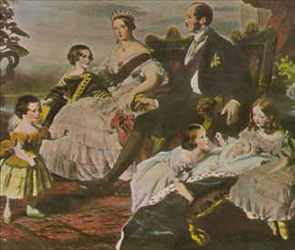 The loving family of Victoria and Albert was devastated by the Confederates. |
|
This political cartoon appeared in a British newspaper and warned the prince against advising Victoria to pursue peace.
Official cause of the Prince's death was typhoid fever!!
The official cause of death was TYPHOID FEVER–a very infectious disease:
The cause of Prince Albert's death was officially given as "typhoid", doubtless attributable to "the noxious effluvia" which escaped from the drains at Windsor. As one courtier put it, "There are more stinks in royal residences than anywhere else". Nevertheless, there are grounds for supposing that the Prince may have died from some other cause. In the first place, Sir James was notorious for errors in diagnosis. Indeed, most of the royal physicians, according to Lord Clarendon, were unfit "to attend a sick cat." Secondly, the doctors were plainly puzzled by some of their patient's symptoms. Thirdly, it is rare to find solitary victims of typhoid. It is possible therefore that the Prince's fatal illness was the terminal episode of a chronic disease, such as cancer of the bowels. (St. Aubyn, Queen Victoria, p. 328).
It was a miracle indeed that nobody else in the queen's household caught this highly contagious disease.
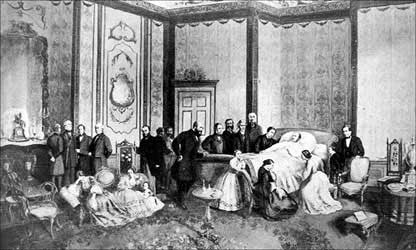 Bedroom scene at the death of Prince Albert. Nobody else caught this "highly infectious" typhoid disease. |
|
Victoria and Albert are buried together in the royal mausoleum at Frogmore Estate, Windsor Castle, in the English countryside of Berkshire.
|
The final draft of the letter to President Lincoln was a lot less belligerent than the initial letter of Palmerston.
The Prince Consort averted a world war!!
Prince Albert not only averted a war between the U.S. and Great Britain, but he also prevented a world war. Immediately upon hearing of the Trent Affair and the warlike preparations of Great Britain, Czar Nicholas II of Russia dispatched a fleet of warships to New York and San Francisco. The Czar had a score to settle after the humiliation of the Crimean War and the assassination of his father, Czar Nicholas I, in 1855.
The admirals of the Russian fleets had sealed orders and were told to report to President Lincoln in the event of a declaration of war by England or France:
It is worthy of special notice that, during the entire period of the American Civil War, the most powerful ruler in all Europe was an outspoken and steadfast friend of the United States. If a war had occurred between England and the northern states of America as a result of the affair of the Trent, it is well-nigh certain that the Federal government would have had a powerful ally in the Czar, Alexander of Russia, who, doubtless, remembered the losses he had recently sustained in the Crimean war. In this war England had been his most powerful enemy. In a few weeks after the capture of the Confederate commissioners, a fleet of Russian war vessels appeared in New York harbor and remained there for several months. At the same time a number of Russian men-of-war were stationed at San Francisco. No official explanation was ever given for the long-continued presence of these war vessels in American waters. Their extended visit caused much comment, but their purpose was easily divined and their presence was not unwelcome while a war between England and the northern states was imminent. (Harris, The Trent Affair, pp. 208-208).
Had Russia declared war on England, France would have sided with England. Prussia undoubtedly would have attacked France and before long a world war would be in progress.
President Lincoln's assassin found a refuge in Rome!!
The great emancipator guided the ship of state through the most terrible storms ever to confront a nation. Traitors lurked everywhere both at home and abroad....John Surratt–an associate of John Wilkes Booth–found a refuge in Rome before his arrest and return to the U.S.
|
John Wilkes Booth escaped like John Surrat, but Surrat was later arrested while serving with the Papal Zouaves.
The Lincoln dynasty that never was!!
Imagine if the United States had a Lincoln DYNASTY dedicated to the propositions that guided the great President....The CONfederates would never have been able to hijack the nation with their Roosevelts and Rockefellers.
President Lincoln's lone surviving son, Robert Todd Lincoln, had a son who was the very image of his grandfather. His name was called Abraham Lincoln II. One Lincoln was more than the CONfederates could bear, so he had a timely demise at the young age of 16.
|
Robert Todd Lincoln was U.S. Minister to Britain from 1889 to 1893. While in London, he sent his son to Versailles to learn French, as preparation for entrance to Harvard University to study law. Father and son had plans to open a law practice named: LINCOLN & LINCOLN.
Just the name ALONE would have assured Abraham Lincoln II the White House:
As Minister to the Court of St. James, Robert Lincoln established his family at 2 Cromwell House, S. W. The Lincolns had two daughters, Mary and Jessie, and an idolized son named Abraham Lincoln, II, whom they called "Jack." He had been born on August 14, 1873, in Chicago. In the fall of 1889, they sent him to a school in Versailles, France, so that he might learn French and prepare himself for Harvard. Unfortunately, he became afflicted with a malignant carbuncle under one of his arms. A French surgeon removed the growth on November 6. However, Jack contracted blood poisoning (septicemia) and was returned to London for treatment. There, he died at just a few minutes after 11:00 a.m. on March 5, 1890, as his father sat at his side in their home. Like Tad's illness, "Jack's" lungs filled with fluid and he struggled to breathe until death finally came. Although blood poisoning has been given repeatedly as the cause of his demise, the official death record states simply that pleurisy killed him. (Temple, Abraham Lincoln: From Skeptic to Prophet, p. 414).
France and England were the last places for a Lincoln after their disappointment at the outcome of the Civil War.
President Lincoln's 210th anniversary is February 12, 2019
President Lincoln was born in a humble log cabin in Hodgenville, Kentucky, on February 12, 1809.
President Lincoln, his wife Mary, and 3 young sons await the Resurrection Day in Lincoln's hometown of Springfield, Illinois.
|
Another Abraham Lincoln was just too much for the CONfederates, so President Lincoln's grandson had a timely demise at the young age of 16.
|
Robert Todd Lincoln and his son Abraham II sleep together in the same tomb in Arlington National Cemetery in Virginia.
Vital Links
|
|||||
References
Bennett, Daphne. King without a Crown: Albert, Prince Consort of England 1819-1861. J. B. Lippincott & Co., Philadelphia & New York, 1977.
De Tocqueville, Alexis, Democracy in America. (in 2 volumes), The University of Chicago Press, Chicago, 2000, (First published in 1835).
Ferris, Norman B. The Trent Affair: a Diplomatic Crisis. University of Tennessee Press, Knoxville, 1977
Guedalla, Philip, Palmerston. G. P. Putnam's Sons, New York & London, 1971.
Harris, Thomas L. The Trent Affair. The Bowen-Merrill Co, Indianapolis, 1896.
Ridley, Jasper. Lord Palmerston. E. P. Dutton & Co., New York, 1971.
Temple, Wayne C. Abraham Lincoln: From Skeptic to Prophet. Mayhaven Publishing, Mahomet, Illinois, 1995.
Thomas, Benjamin P. Abraham Lincoln, A Biography, Alfred A. Knopf, New York, 1952.
Roscoe, Theadore. The Trent Affair, November, 1861. Franklin Watts, Inc. New York, 1972.
Strachey, Lytton. The Illustrated Queen Victoria. Weidenfeld & Nicolson, New York, 1987.
St. Aubyn, Giles, Victoria, A Portrait. Atheneum, New York, 1992.
Woodham-Smith, Cecil. Queen Victoria. Alfred A. Knopf, New York, 1973.
Weintraub, Stanley. Uncrowned King: The Life of Prince Albert. The Free Press, New York, 1997.
Copyright © 2015 by Patrick Scrivener
